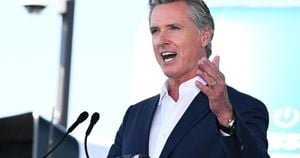Donald Trump’s presidential transition is currently facing tumultuous times, marked by threats directed at his cabinet nominees and other appointees. Following the recent elections, it has been reported by numerous sources, including Fox News and CNN, about alarming incidents where nearly twelve appointees were targeted with violent threats, including bomb threats and swatting. Such incidents have raised serious concerns about the safety and security of those elected officials stepping forward to assume their positions within the new administration.
This unusual wave of threats, emphasized by Trump’s transition team, describes these acts as "violent, unAmerican threats" aimed not just at the appointees themselves, but also at their families. Karoline Leavitt, Trump's incoming White House press secretary, recounted how some nominees received bomb threats. Several law enforcement agencies were reportedly quick to respond, ensuring their protection and investigating the nature of these disturbing events.
Among those affected are high-profile individuals such as John Ratcliffe, named as Trump’s nominee for the CIA director, and Rep. Elise Stefanik, who is slated to be the UN ambassador. Threats like these are unprecedented and highlight the increasingly hostile environment surrounding political appointments. Leavitt confirmed to Fox News Digital how local law enforcement reacted to the threats, with police visiting the nominees' homes to secure safety.
To compound the tensions of this transition period, the FBI has acknowledged several bomb threats and swatting incidents targeting these new nominees. The bureau indicated it is actively working alongside local law enforcement to mitigate these threats, maintaining vigilance and encouraging public cooperation to report suspicious activities. This alarming backdrop raises questions about the climate surrounding political transitions and the attendant risks officials face entering public service.
Reflecting upon the current situation, Trump’s transition team is reportedly seeking stability amid the chaos. Their aim is to focus on uniting the nation and ensuring (to the extent possible) the well-being of all those involved as they proceed to hold office. The swift actions taken by the FBI and various police departments speak to the urgency of the matter.
Meanwhile, Trump’s administration is quietly rolling out its planned Cabinet picks. On the table are various positions, including the appointment of Ret. Gen. Keith Kellogg as special envoy for Ukraine and Russia. Such nominations are part of Trump’s broader initiative to solidify his presence and influence as he steps back onto the national stage. The list of nominees has sparked discussions around trust and loyalty within Trump's inner circle as many of the appointees have been long-time allies, raising the question of whether this strategy is wise or could threaten the administration's effectiveness.
Outside of these severe threats, Trump has reached out to notable figures from the business sector. Recently, he met with Meta's Mark Zuckerberg at Mar-a-Lago, indicating potential collaboration and rapport-building between the tech giant and the incoming administration. Zuckerberg expressed gratitude for the opportunity to connect with Trump, highlighting the importance of innovation for America’s future. The conversation, details of which remain under wraps, suggests Trump's intent to form alliances broad enough to sustain his initiatives.
While this new administration seems focused on key political actions and establishing necessity-driven collaborations, they must also navigate the public sentiment and rising anxieties produced by incident-based threats. This growing tension mirrors concerns over democratic norms and the ebb and flow of civil discourse, particularly as the nation prepares for the 2024 presidential elections.
Looking back on the saga of Trump's transition, one might ponder: will the pending storm of threats and challenges hold the power to dissipate Trump’s efforts to consolidate his administration and push his agenda? The path of this political transition seems fraught with complications, but only time will reveal how it all plays out.



